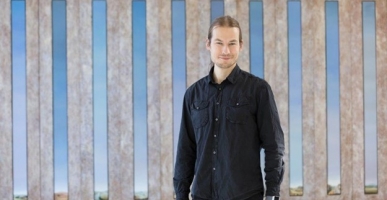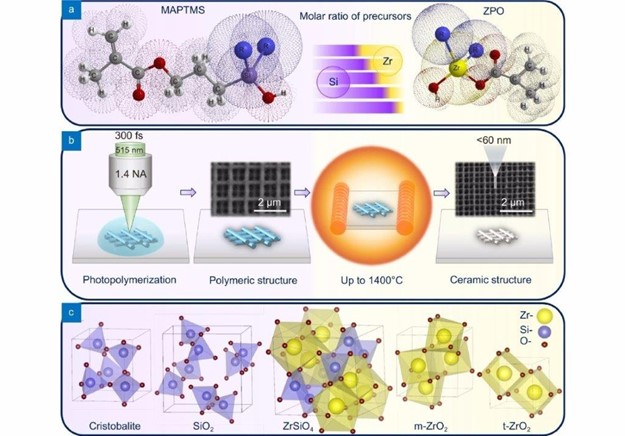Events
A Publication in a Prestigious Journal Opens Up New Possibilities for the Production of Inorganic 3D Nanostructures
24 02 2022
A Publication in a Prestigious Journal Opens Up New Possibilities for the Production of Inorganic 3D Nanostructures
The research by Prof. Mangirdas Malinauskas, a member of the Young Academy of the Lithuanian Academy of Sciences, together with Dr Darius Gailevičius and Edvinas Aleksandravičius, researchers at the Laser Research Centre (Faculty of Physics, VU), Greta Merkininkaitė, and Prof. Simas Šakirzanovas, was published in the prestigious scientific journal Opto-Electronic Advances [Impact Factor 9.682].
The interdisciplinary experimental work demonstrates that laser multiphoton lithography combined with high-temperature calcination can be used to materialise three-dimensional nano-particles from a variety of crystalline phases, which depend on the initial chemical composition of the hybrid organic-inorganic polymer being processed and on the parameters of heating.
The results achieved by the researchers open up conceptually new possibilities for the optical 3D printing of micro- and nano-particles, using the widely used photopolymerisation process, simultaneously endowing the final product with the properties of inorganic materials (temperature resistance, mechanical hardness, transparency, chemical inertness, etc.). This is a major breakthrough in the fabrication of resilient micro-optical, nanophotonic, biomedical, micro-mechanical, or microfluidic cells. Devices made of such components have a long lifetime and can operate in vacuum or under widely varying temperatures and pressures, e.g. in open space.

Prof. Malinauskas gave a remote presentation on this topic when launching the Laserlab-Europe Talk webinar series on 9 February (17:00 EET). The video recording of the presentation is freely available here: https://www.youtube.com/watch?v=hWF-Fh-yHAs.
The original publication – Merkininkaitė G, Aleksandravičius E, Malinauskas M, Gailevičius D, Šakirzanovas S. Laser additive manufacturing of Si/ZrO2 tunable crystalline phase 3D nanostructures. Opto-Electron Adv 5, 210077 (2022). doi: 10.29026/oea.2022.210077 – is open access and available at https://www.oejournal.org/article/doi/10.29026/oea.2022.210077.
The research was carried out within the framework of the projects ‘Enhancing absorption by slowing down light in photonic nanoparticles and its application in efficient sensors’ (W911NF-16-2-0069, AMRDEC) and LaserLab Europe (871124, H2020).
Information of the Young Academy of the Lithuanian Academy of Sciences
